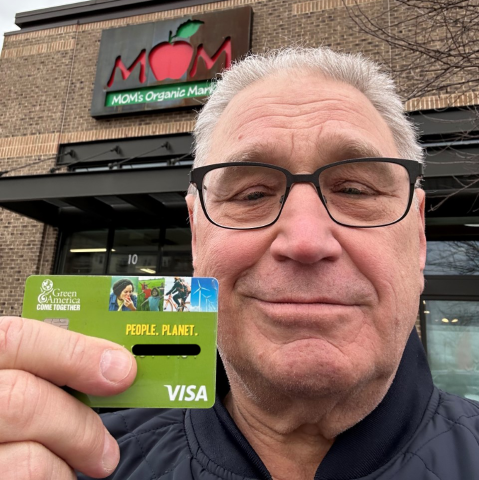
Green America’s Get A Better Bank campaign, and similar initiatives across the country, are gaining momentum! Did you know that Big Banks, like those behind your credit cards, continue to invest massively in fossil fuels, driving us toward greater climate catastrophe? They also have a long history of predatory and racist practices that have harmed people of color for generations.
Fortunately, there are better credit cards! And people everywhere are making the switch!
Our interview with Jim Blasiak describes his motivation for helping congregants at his synagogue get a better credit card to put their money to work for communities – and to avoid supporting fossil fuels. Here's the letter congregants sent to conventional big banks explaining why they made the switch.
If you’re ready to switch not only your credit card but also your bank, get started with these 10 steps to switch to a better bank or credit union.
Green America (Q.) and Jim Blasiak (A.).
Q. I heard that your synagogue recently concluded its campaign to promote “green” credit cards.
A. That’s right. We had over two dozen congregants sign up for the Green America credit card or other alternative credit cards found on the Green America website.
Q. How do you define a “green” credit card?
A. A card that is issued by a local or regional community bank or a credit union and not by a big bank that finances fossil fuel development. One good example of a “green” credit card is the Green America credit card that is issued by TCM Bank.
Q. Why the interest in credit cards?
A. Our shul has an active Climate Action Team that is always looking for ways to promote climate solutions and address climate justice issues. We are fortunate to belong to a community that is open to dialogue and action on climate change and that our clergy have emphasized those parts of our tradition that emphasize caring for the earth and our fellow humans. At a regular team monthly meeting a little over a year ago, one of our members brought to our attention a new release of the Rainforest Action Network’s report on banking and climate change. We all went back and read it and then at subsequent meetings we talked about organizing an event to highlight and perhaps address the findings of that report. One thing that the team recognized was that talking about the intersection of environmental and financial issues was likely to stimulate discussion among a broad group of congregants.

Q. So what were the results of that discussion?
A. Well the topic is a bit complicated, and we realized that we needed to be better informed. So we first decided to organize two zoom webinars (this was during the early days of the pandemic) to bring in experts to discuss the general topic of “greening our finances.” We invited two experts: a financial advisor that specializes in socially responsible investments and Fran Teplitz, a co-director of Green America, to talk about alternative banking options. All members of our congregation and their friends were invited to attend. We also found area environmental groups to co-sponsor the event. At a second webinar, we asked Fran to return and also invited Andy Behar of “As You Sow” to discuss his organization’s shareholder activism and his organization’s helpful website and a Greenfaith representative, Sara Shor, to discuss how to best organize our community.
Q. What did the Climate Action Team learn from these webinars?
A. We had to simplify the issue in order to develop a campaign that could involve the entire congregation. It turns out that personal financial decisions are just that -- personal -- and it is tricky to advise congregants to make one investment over another. Also, the world of socially responsible investing is many flavored and team members are not qualified financial advisors, so asking congregants to change their financial plans, we decided, was beyond our current capabilities. We also considered a campaign to have congregants change their bank from a mega-bank to a community bank, but we have a limitation here in the suburban Washington, DC, market because there are not many local banking options available for walk-in banking. Also, recommending a bank to someone carries some of the same pitfalls as recommending an investment. With these lessons in mind, we landed on a first step: asking congregants to sign up for the Green America credit card or another alternative credit card. We have saved these other options for future campaigns.
Q. Why did you focus on the Green America credit card?
A. We tested it. It is issued by TCM Bank, a community bank, and members of the team tried it out first. The sign-up was seamless and quick. Members with good credit ratings got higher credit limits than what they had expected from an alternative bank. And, of course, in the process of researching the matter, we learned that the value of 0.5% of every transaction would be earned by Green America and the balance of the credit card fee (after VISA takes its relatively small cut) would benefit a community bank.
Q. How did you proceed with the campaign?
A. We first publicized the campaign during events sponsored by the Climate Action Team. We had small break-out sessions after our remote Zoom services and some members brought up the credit card campaign during those sessions. Both of these efforts yielded some sign-ups and they turned out to be important because they signaled to all of our congregants that our campaign had started and that it had the backing of our respected Climate Action Team members. The approach that worked best, however, was to ask members of the Climate Action Team to contact their fellow congregants personally and engage them on the subject. All in all, we had over two dozen congregants sign up for the Green America credit card.
Q. Did you get any resistance from your congregants in carrying out your one-on-one personal approach?
A. Not resistance, exactly but we did have to sharpen our approach. One of the first things we realized was that there were other “green” credit card options in addition to the Green America card and our congregants are a curious bunch and they wanted to explore all of those options. Many of our congregants, we discovered to our great pleasure, were already using credit cards issued by their credit unions, so they were not supporting the big banks that funded fossil fuel development. Others had interests in other environmental or social issues, and we were able to direct them to the other options that Green America provides on its website. Another thing we discovered early on was that people like the credit cards that they already have. Some cards provide points or cash rewards, others provide upgrades on airlines or higher credit limits, etc. So at the onset, we abandoned the idea that we would ask congregants to tear up their existing cards -- although some did -- and instead we asked them to use the Green America card more and their big-bank cards less. That approach seemed to work. Finally, there were some congregants who said simply that they had too many credit cards already and that they didn’t want to further complicate their finances. We, of course, had to respect that viewpoint and back away from further discussions on the credit card topic.
Q. Do you think that the credit card campaign helped bring awareness to the climate emergency more generally?
A. Absolutely. One member after hearing about our campaign said that they would sell their oil company stock. (It turns out that that was likely a good financial move given the stock movements this past year.) Others asked for advice on “green” and socially responsible investments and because of our research, we were able to direct them to options and experts, including the Green American site. Finally, I think that one thing that the credit card change has done for me -- and I hope for other congregants -- is that it has brought attention to my spending habits. Over-consumption is no doubt a major contributor to climate change and every time I take out my Green America credit card I am forced to think to myself: “Is this purchase necessary? Is the purchase consistent with my commitment to the environment?” And, even when I have to purchase something that I know is adding to my carbon footprint -- like buying a tank of gas -- I can feel a bit less guilty because I know that at least 0.5% of the cost will go to Green America.
Q. How does the credit card campaign relate to the values of your Jewish community?
A. They are in harmony. There are many relevant Jewish teachings, but the one that I try to hold onto in advocating for the environment in the face of so many challenges is from Pirke Aboth, or “The Ethics of the Fathers” written nearly 2000 years ago. It says: “You are not required to finish your work, yet neither are you permitted to desist from it.” In this context, even though encouraging several fellow congregants to change their credit cards is not going to solve climate change in and of itself, it is the progress that I can make at this time. As a bonus, because the credit card campaign provides a continuing reminder to those that signed up for an alternative card that there is a climate emergency underway, it gives them the nudge to take another positive action toward finishing their work each day.
There are many resources to help you switch to a better banking institution, here are a few so you can get started:






